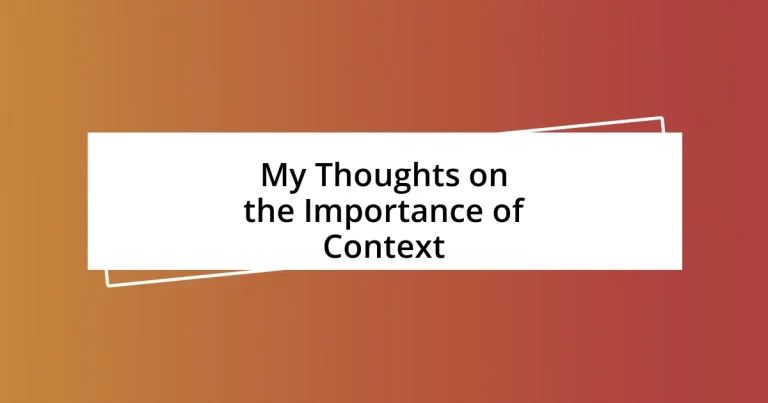Key takeaways:
- Context is crucial in shaping communication; emotional, social, and physical contexts significantly influence understanding and interpretation.
- Recognizing contextual factors in decision-making, such as cultural background and personal circumstances, can lead to more empathetic interactions.
- Enhancing context awareness through active listening, sharing personal experiences, and embracing cultural diversity leads to deeper connections and effective communication.
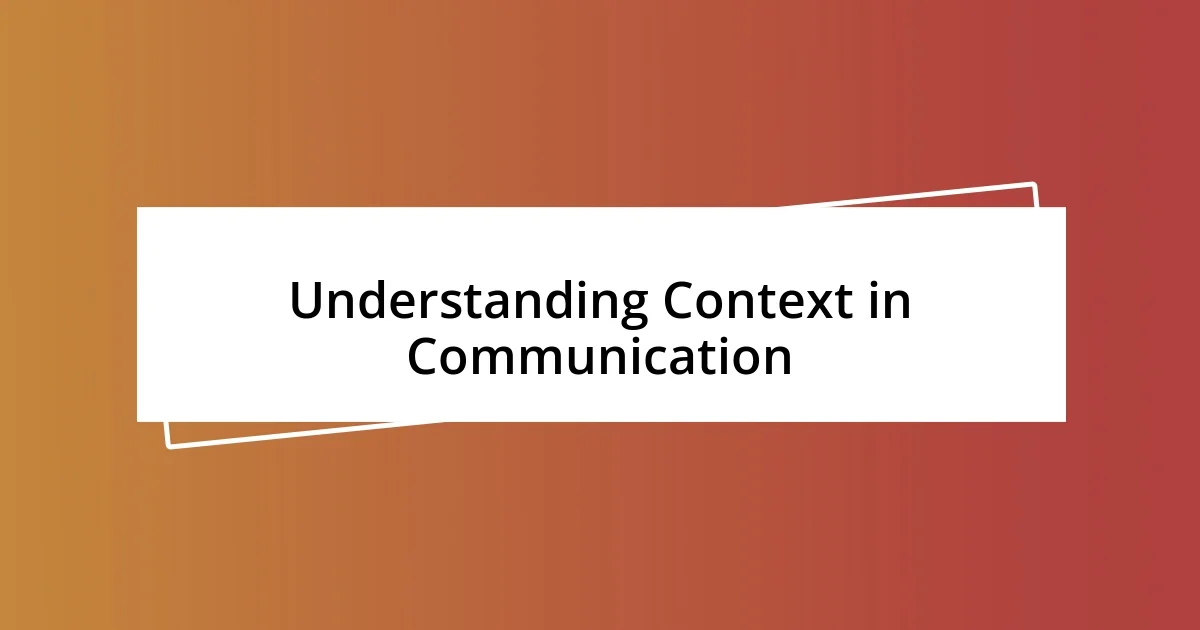
Understanding Context in Communication
I’ve often found that the nuances of context can change the entire trajectory of a conversation. For instance, when discussing sensitive topics, understanding the emotional state of the person I’m speaking with can guide how I phrase my words. Have you ever noticed how a seemingly innocent comment can lead to misunderstandings simply because the context was overlooked?
One time, I was chatting with a friend who had just experienced a loss. I started sharing an unrelated funny story, but her expression shifted from curiosity to discomfort. In that moment, I realized that my lack of contextual awareness had inadvertently blindsided her. I felt a pang of regret, as it highlighted just how critical it is to be attuned to the feelings and circumstances surrounding our conversations.
Moreover, context shapes our interpretations significantly. For example, a joke shared in a relaxed setting can fall flat in a serious environment. This reminds me of how I sometimes tailor my communication style based on who I’m with—what might be humorous with friends could be completely inappropriate in a business meeting. How do you navigate these differences in tone and meaning in your own interactions?
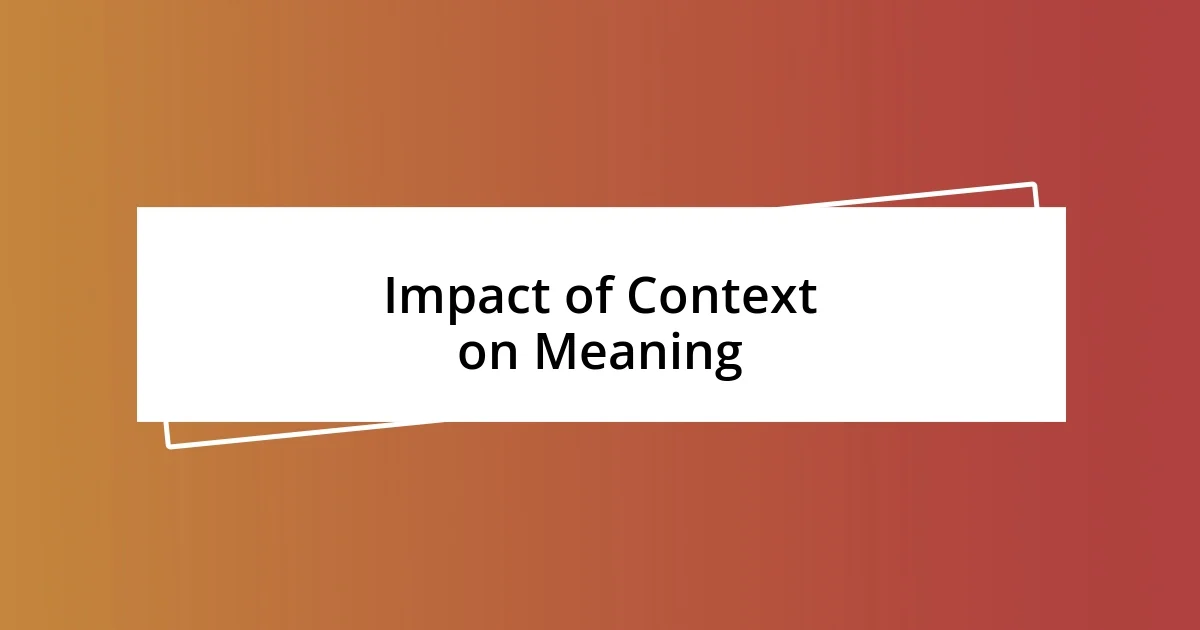
Impact of Context on Meaning
Understanding how context influences meaning is crucial in effective communication. I recall a time when I unknowingly used slang during a business presentation. While my intent was to sound relatable, the unfamiliar expressions left some colleagues confused. This experience reinforced my belief that without considering the audience’s background, our words can easily be misinterpreted. It’s fascinating how context can make or break the clarity of our messages.
Additionally, the emotional setting certainly alters how we perceive communication. Just recently, I noticed my tone shift drastically when a friend opened up about their struggles. My usual friendly banter transformed into a more profound conversation, simply because the context called for it. In these moments, I find myself reflecting on how powerful the right contextual awareness can be in fostering connection and understanding.
Finally, I’ve found that the physical environment plays a significant role too. During a casual lunch, I might discuss personal projects openly, while in a formal meeting, I choose my words meticulously. The same idea can elicit different reactions based on where and how it is presented. These instances highlight the delicate dance of balancing content with the context to achieve a precise communication experience.
| Context Type | Impact on Meaning |
|---|---|
| Social | Shapes interpretations; humor can be lost. |
| Emotional | Guides tone; sensitivity alters responses. |
| Physical | Affects presentation style; formality changes approach. |
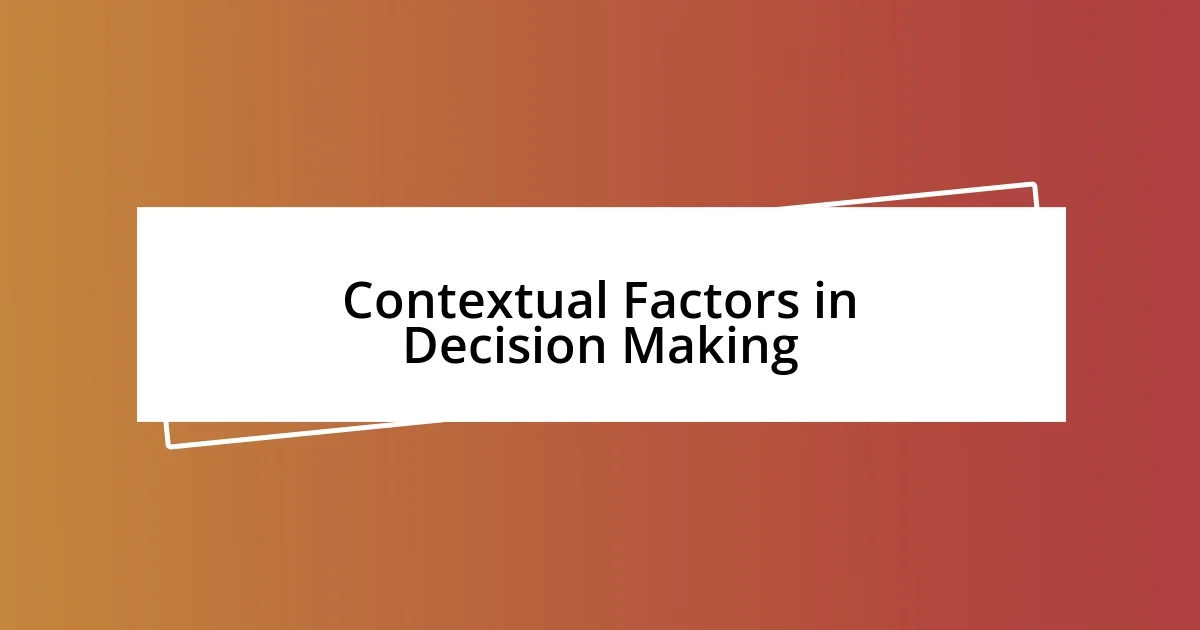
Contextual Factors in Decision Making
Understanding the contextual factors that influence decision-making is essential for any effective interaction. I’ve seen how one’s upbringing or cultural background can heavily sway the choices individuals make. For example, a decision that seems obvious in one culture might be completely overlooked in another, simply because the context shifted. I learned this the hard way during a group project where I suggested a straightforward solution, only to find my team hesitant. Their differing cultural values on collaboration made me realize that without context, even well-intended suggestions could be met with resistance.
Additionally, factors like timing and personal circumstances should not be underestimated. I recall a situation where a friend was facing career decisions amidst personal turmoil. Each time I offered advice, I realized that the weight of their emotional state overshadowed the practicality of my suggestions. This taught me that context isn’t just about the environment but also about people’s experiences and current situations. Consider these factors while making decisions:
- Cultural Background: Influences values, ethics, and perceptions of appropriateness.
- Timing: Urgency may lead to rushed decisions, while a relaxed atmosphere can foster thoughtful consideration.
- Personal Circumstances: Emotional states or life events can cloud judgment or impact priorities.
- Social Dynamics: Group dynamics can alter risk assessments and decision outcomes.
Recognizing these contextual elements can lead to more empathetic and effective decision-making processes.
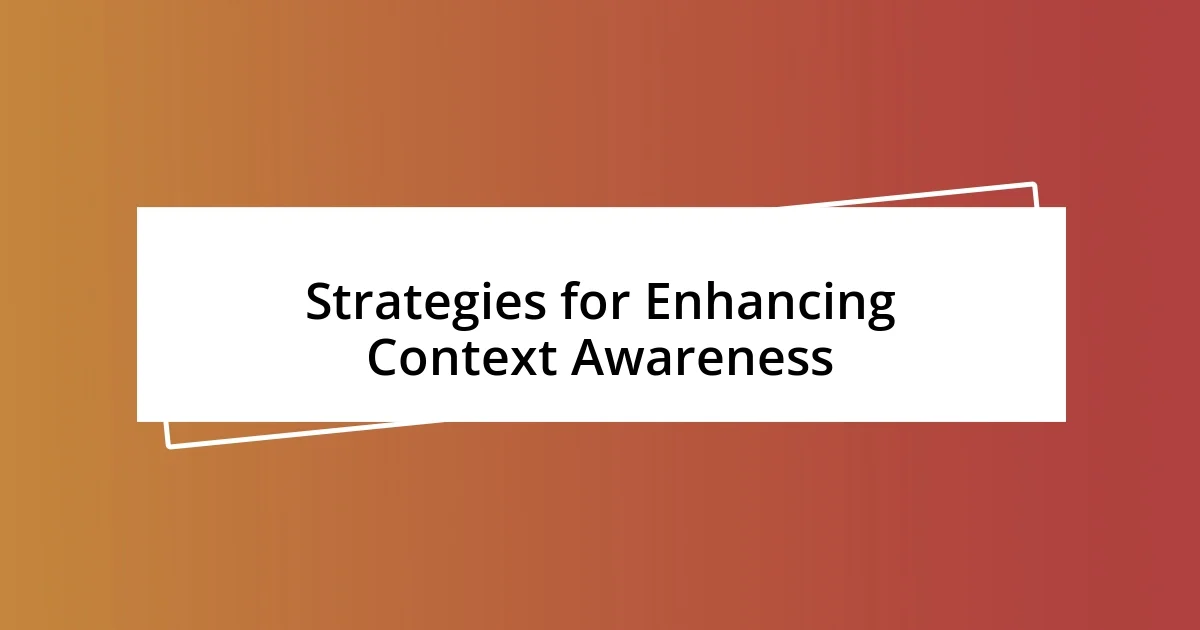
Strategies for Enhancing Context Awareness
Enhancing context awareness can significantly improve how we communicate. One strategy I’ve found effective is active listening. I remember a meeting where I focused entirely on my colleague’s words, but it wasn’t just about hearing; I tuned into their emotions and body language. This awareness helped me respond more thoughtfully, ultimately leading to a richer discussion that addressed underlying concerns. How often do we listen without truly understanding what’s being said?
Incorporating personal experiences into conversations can also provide valuable context. The other day, while catching up with a friend, I shared a related story from my work life. This not only made the discussion more engaging but also created a backdrop against which we could relate our thoughts. By connecting our experiences, we deepened our understanding of each other’s perspectives. Have you tried sharing personal anecdotes to bridge gaps in understanding?
Finally, embracing cultural diversity is a powerful strategy for enhancing context awareness. I vividly recall attending an international seminar where various cultural viewpoints were shared. It opened my eyes to the vast array of meanings and interpretations that can exist. By valuing diverse backgrounds, we enrich our conversations and broaden our contextual lens. Isn’t it intriguing how much more we can learn when we welcome different perspectives?
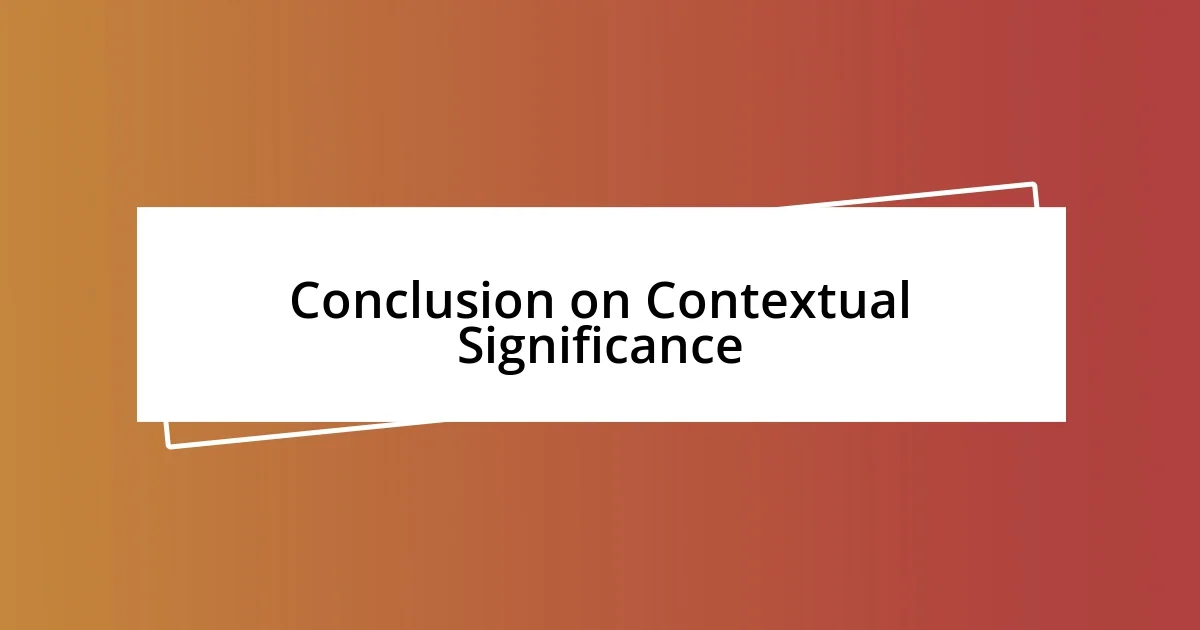
Conclusion on Contextual Significance
Understanding the significance of context transcends the mere act of communication; it’s about creating genuine connections. I remember once trying to comfort a friend who faced a setback at work. I instinctively offered my support, but it wasn’t until I grasped the full scope of their situation that my words resonated, turning my empathy into a lifeline. Context allowed me to provide the support they truly needed, reaffirming how critical this awareness is in all our interactions.
Moreover, I’ve often reflected on how context shapes our environment too. For instance, consider a frustrating day where everything seems to go wrong. In moments like these, remembering that others might be dealing with their own unseen battles can shift our perspective. It has taught me to pause and think: how would I feel in their shoes? This insight underscores the vital role that context plays in not just understanding but also in fostering compassion.
Ultimately, the power of context connects us in profound ways. Have you ever found yourself realizing that a seemingly trivial detail actually held significant meaning? These moments remind us that the layers of context enrich our lives and interactions. They challenge us to dig deeper and appreciate that every choice and reaction is influenced by a tapestry of experiences and emotions. Embracing this complexity can lead us to more thoughtful decisions and a deeper understanding of one another.












